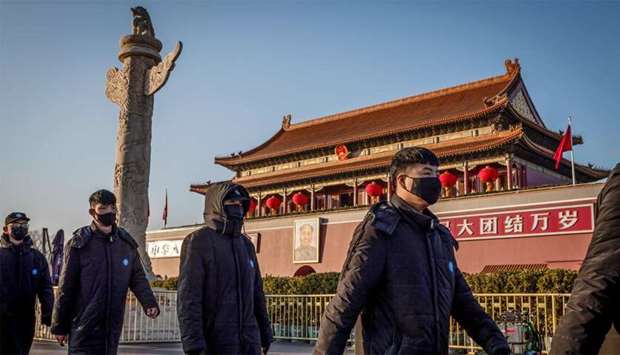Three more cities in China's Hubei province said on Thursday that they have imposed travel bans as a new virus that has infected hundreds of people continues to spread from the province's capital city of Wuhan.
Huanggang and Ezhou have joined Wuhan in shutting down railway stations and suspending long-distance buses, according to statements on the cities' websites. The smaller city of Chibi said public transport and connections to other places would be suspended from midnight (1600 GMT).
Authorities are trying to prevent the potentially deadly virus from spreading further, as hundreds of thousands of people are planning to travel home for the Lunar New Year this weekend.
Beijing authorities have cancelled ‘large-scale’ events, including New Year celebrations, in order to prevent the spread of a new coronavirus, state media reported on Thursday.
The ‘large-scale events’ include traditional temple fairs, the state-run newspaper Beijing Evening News said on the Weibo messaging service.
The capital's main tourist attraction, the Forbidden City, announced that it will be closed to visitors from Saturday, while cinemas put off the release of seven new films for fear the virus would spread in movie theatres.
Seventeen people have died and 620 have been identified as carrying the virus, according to official figures. The Geneva-based World Health Organization was due to decide whether to declare the outbreak a public health emergency.
The real numbers could be much higher, as many patients in Wuhan are reportedly unable to receive treatment due to the overcrowding of hospitals.
Experts at Imperial College in London estimated a total of 4,000 cases had symptoms by January 18.
Wuhan's airports and train stations were shut down and long-distance bus, metro and ferry services out of the city of 11 million people were suspended, state broadcaster CCTV reported.
The measures come in the middle of the world's largest annual human migration, complicating efforts to contain the disease. Millions of people are travelling from major cities like Wuhan to family homes for the Lunar New Year celebration, which starts on Saturday.
‘The mood is relatively heavy,’ Zhang Lin, a professor at Wuhan University, told dpa over the phone. ‘We are trapped in Wuhan and cannot leave.’ Zhang said her elderly parents had come to Wuhan from a different province to see doctors for their chronic conditions, but were now unable to go to the hospital, with hospitals considered hotbeds of infection.
Zhang said her family is staying mostly indoors, at their residence on the Wuhan University campus, and is trying to deter the elderly parents from going to the market to shop for Chinese New Year.
She said she still sees many people on the street not wearing a mask, despite the government ordering everyone to wear masks in public spaces.
Wuhan authorities this week installed infrared thermometers at airports, railway and bus stations and said public transport vehicles were being disinfected daily.
Nevertheless, authorities seem to have failed to accommodate the large numbers of patients seeking medical care.
The South China Morning Post reported that hundreds of people, including many with pneumonia symptoms, were queueing at the Xiehe Hospital in Wuhan to see a doctor. Patients told the paper the hospital had run out of space and they were being sent back home.
The new coronavirus belongs to the same family of viruses that caused severe acute respiratory syndrome (SARS), a disease that infected 8,000 people and killed 800 globally in a 2002-03 pandemic that also started in China.
Scientists suspect the virus was first transmitted to humans from wild animals, which were illegally traded at a seafood market in Wuhan. The virus later mutated and became transmissible from person to person, they said.
Cases of the disease have been reported in Japan, the Philippines, South Korea, Taiwan, Thailand and the United States, as well as in the Chinese territories of Hong Kong and Macau.
India said on Thursday that a nurse working at a hospital in Saudi Arabia had become its first national to be infected by the coronavirus. Singapore also announced its first case, a 66-year-old man from Wuhan who had arrived in the city-state with his family on Monday.
In Australia on Thursday, biosecurity teams checked for the coronavirus passengers and crew arriving in Sydney on a China Eastern Airlines flight from Wuhan, government officials said. It was the last direct flight before the city was shut down.
Passengers of a China Southern Airlines flight from Wuhan to Rome were also checked and showed no symptoms of the disease, according to Rome airport authorities.
Meanwhile, Air France confirmed that it had suspended its direct service to and from Wuhan.



